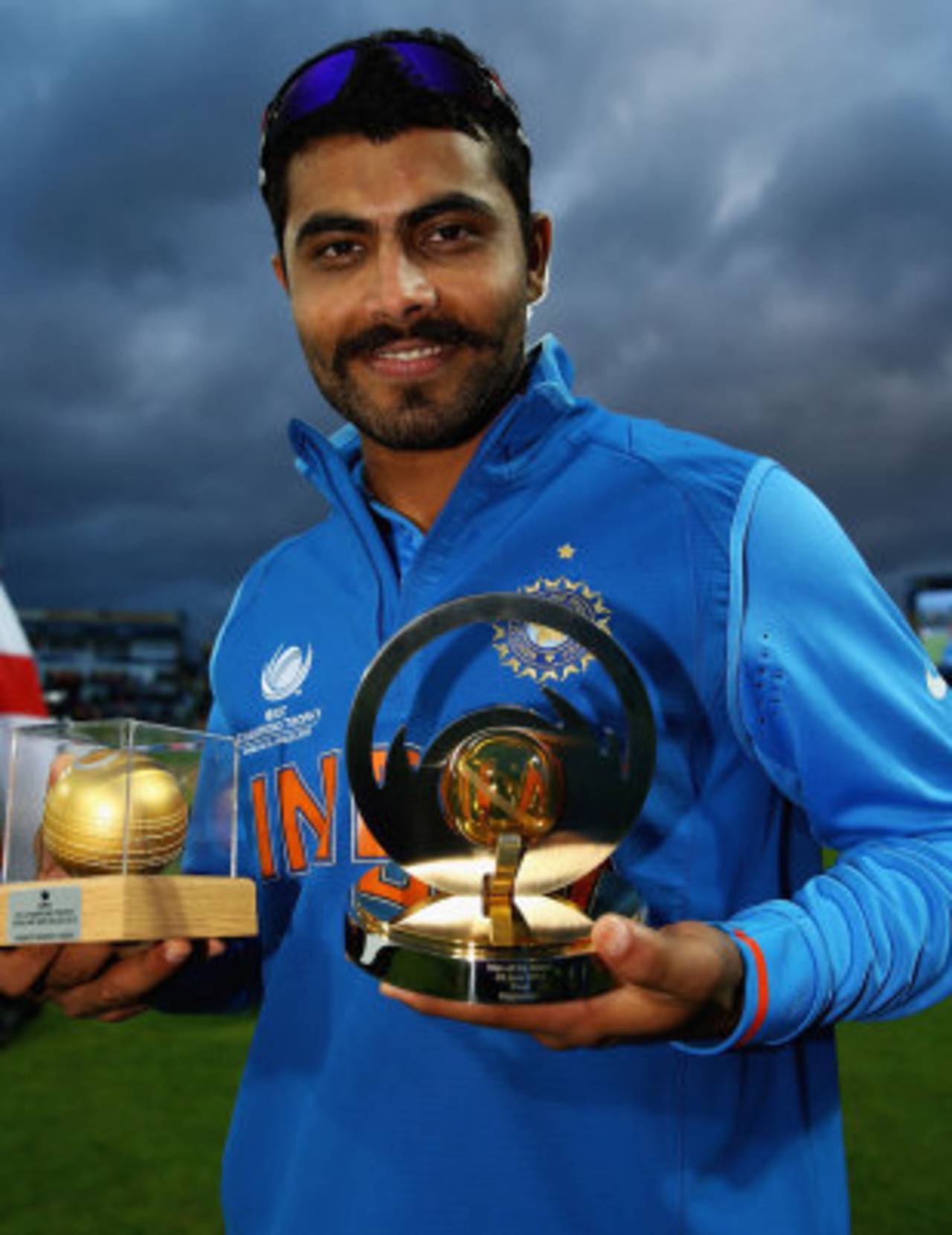In spite of Shikhar Dhawan's highly skilled and audacious batting, in spite of
Mahendra Singh Dhoni's calm and yet out-of-the-box leadership, my player of the tournament at the Champions Trophy was Ravindra Jadeja. It wasn't a difficult choice. Dhawan and Dhoni were giants of the tournament but every time India needed a game-changing moment, Jadeja was in the picture. You sought him out in the field, you counted how many overs he had left and you backed him to get a big over with the bat in the end.
You judge players by whether they comfort you or unsettle you. Images get built over time and create expectation or anxiety. Then they are reinforced. If you fear a bowler is going to concede that big over and he does, the moment stays longer in the mind. So too with the match-winner.
For the first three years of his career, Jadeja unsettled you. If you needed 30 at a run a ball or the opposition needed nine an over in the last five, you worried when he came on. He gave the impression he did too.
In the Champions Trophy, though, his body language was infectious. And he produced the game-changing moments. He got the crucial runs at the end
against South Africa (47 not out from 29 balls), produced the run-out of Robin Peterson and bowled nine overs for 31 in a 6.5-an-over game.
West Indies were 103 for 1 inside the 20th over, then lost three wickets for six in four overs, all to Jadeja.
Against Pakistan, he befuddled Misbah-ul-Haq at a crucial moment, and his dismissal of Mahela Jayawardene
in the semi-final showed he could get a mighty player of spin undone by cleverly camouflaged change of pace. So, by now, a reputation had been built. You knew he was the captain's go-to cricketer but you waited to see if he could do it on the big day.
At two points in
the final, India looked gone. After 14 overs they were 67 for 5, and Dhoni's hope for 130 meant the score had to be doubled in the last six. Virat Kohli set the scene with a largely undervalued 43, but it still needed the final flourish that Jadeja's 33 from 25 provided.
I thought his real graduation came in the last two overs of the game. He bowled the 19th, a Powerplay over, after Ishant Sharma's drama-filled 18th, and conceded a mere four with 19 needed. He might just have given Dhoni his seventh batsman and fifth bowler, and the fact that it didn't surprise anyone showed it was a coming of age. Where once you feared the moment, you were now reassured. Jadeja had climbed the ladder.
For the first three years of his career, Jadeja unsettled you. If you needed 30 at a run a ball or the opposition needed nine an over in the last five, you worried when he came on
He was expected to. In May 2008, Shane Warne introduced me to his "rock star", a young batsman who bowled a bit. On the 26th, Mumbai Indians were playing Rajasthan Royals
in Jaipur on a really slow pitch. Chasing 146, Royals were down to 103 for 5 after 17 overs. Forty-three were needed from three, against a side with international bowlers. Royals had two young left-handers batting for them; Niraj Patel of Gujarat and Ravindra Jadeja. They batted fearlessly, ran like the wind between the wickets, and got there off the last ball. Patel was the better batsman that day but Jadeja was the one you remembered because Warne had said he was good.
It was to be a double-edged sword because it raised expectations, and over the next three years it hurt him. I am not sure he was ready for the pressure situations he found himself in, and as he faltered, the burden grew. As the burden grew, it made it more difficult for someone who was still a very young man. By 2011 he was on a downward spiral and the butt of jokes by unforgiving bloggers who hid behind assumed names. You still kept track of him but he needed to hit you with his performances.
He did. The following year he
hit three triple-centuries and bowled long spells on surfaces that gave him nothing. It forced him to be accurate and patient, and in retrospect that period away from the limelight forced him to look at his game again. When he got a surprise call up for the
Nagpur Test against England, he was able to bowl 70 overs at under two an over. And it was his accuracy that brought him
all those wickets against Australia.
Now he must battle expectations again. And he must deliver in conditions that will not be as friendly as the ones England put out. In one-day cricket it may not be as big a challenge as in Test cricket, where India still seek this elusive five-bowler line-up. In Test matches in South Africa, in England, in New Zealand and Australia (the next four on India's calendar), he will have to bat at No. 6, and that is an examination he hasn't faced yet. I believe that is where he must eventually gravitate towards. India's ideal balance will lie in Jadeja becoming the batting allrounder and Ashwin, at No. 8, the bowling allrounder. In Test cricket Jadeja is still very much work in progress.
The Champions Trophy has been a giant leap for him. And the next 20 months are full of opportunity and challenge. He must relish both.
